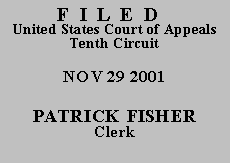

| CHARLES HAMPTON,
Petitioner-Appellant, |
|
| v. | |
| ARISTEDES W. ZAVARES;
ATTORNEY GENERAL OF THE
STATE OF COLORADO,
Respondents-Appellees. |
|
Petitioner Charles Hampton, a state prisoner appearing pro se, seeks a certificate of appealability (COA) to challenge the district court's dismissal of his 28 U.S.C. § 2254 habeas petition. We deny a COA and dismiss the appeal.
In 1986, Hampton was convicted in state court of two counts of aggravated robbery and one count of use of a weapon. He was sentenced to two consecutive forty-year terms of imprisonment. His convictions were affirmed on direct appeal on February 13, 1992, and his petition for certiorari to the Colorado Supreme Court was denied on July 27, 1992. Hampton did not seek post-conviction relief in state court.
Hampton filed this habeas petition on June 5, 1997, alleging he was denied effective assistance of counsel during trial and on appeal, and he was singled out for prosecution solely because of his race and his "individuality." The district court issued a show cause order to Hampton because it did not appear his habeas petition was timely filed. Hampton responded that he had delivered his petition to prison officials within the prescribed time. The magistrate judge stated it was filed "within the time limit" and would be considered on its merits. The magistrate found that Hampton had failed to exhaust state remedies and recommended dismissal of the petition. After considering Hampton's objections to the magistrate's recommendation, the district court dismissed the petition for failure to exhaust state remedies.
The substance of a habeas petitioner's federal claims must be fairly presented to the state courts before they can be raised in federal court and petitioner bears the burden of demonstrating that he has exhausted available state remedies. See Oyler v. Allenbrand, 23 F.3d 292, 300 (10th Cir. 1994). The magistrate found that although Colo. Rev. Stat. § 16-5-402 appeared to bar state post-conviction relief due to a three-year time limitation, under subsection (2)(d) of the statute, a Colorado district court could exercise its discretion to excuse petitioner from the time limitation upon a finding of "circumstances amounting to justifiable excuse or excusable neglect." Hampton argued he did raise the issues in his pro se motions. However, the magistrate noted that Hampton was represented by counsel and the court had no duty to address issues raised in pro se filings. See People v. Arguello, 772 P.2d 87, 92-93 (Colo. 1989).
Hampton has not "made a substantial showing of the denial of a constitutional right." See 28 U.S.C. § 2253(c)(2). We DENY the application for a COA, DENY the request to proceed on appeal in forma pauperis, and DISMISS the appeal. The mandate shall issue forthwith.
Entered for the Court
Mary Beck Briscoe
Circuit Judge
*.This order and judgment is not binding precedent, except under the doctrines of law of the case, res judicata, and collateral estoppel. The court generally disfavors the citation of orders and judgments; nevertheless, an order and judgment may be cited under the terms and conditions of 10th Cir. R. 36.3.